- Home
- Captain W E Johns
26 Biggles Sweeps The Desert Page 16
26 Biggles Sweeps The Desert Read online
Page 16
Dry-lipped, feeling sick and faint, Biggles turned to meet the Messerschmitts. The matter would soon be over one way or another. He knew he could not hang out for more than asfew minutes. The Messerschmitts seemed to be a long way away. He could not think what they were doing. He found it hard to think at all. From their behaviour it seemed that the hostile aircraft were hesitating, inclined to break off the combat. Set-ting his teeth he flew straight at them. Then a move-ment to the right caught his eye, and he saw four machines in a scattered line roaring towards the scene. For a moment he stared at them uncomprehendingly. Then he understood why the Messerschmitts were packing up.
The Karga Spitfires had arrived.
But what were they doing? They appeared to dance in the air like midges over a garden path on a summer night. They became blurred, like a photograph out of focus. The sky was beginning to turn black. Biggles bit his lip until it hurt. His hands were trembling, clammy; cold sweat broke out on his face. 'My God!' he thought. 'I'm going to faint.'
Pulling back the cockpit cover he tried to rise, to throw himself out, but all the strength seemed to have left his body. Abandoning the joystick, he used both hands to raise himself, but as the full blast of the slipstream struck him he paused, gulping in the refreshing air. It revived him. He began to feel better. Things began to clear, so he slid back into his seat, cut the engine, and began a steady glide down. At first he was content to lose height, but as his strength returned he looked around and set a course for the oasis.
His landing was purely automatic, although he
would have run on into the trees had not a mechanic had the wit to dash out and grab a wing tip so that the machine slewed round, raking up the sand. Biggles switched off and sat still, limp from reaction. Flight-Sergeant Smyth's face, pale with concern, appeared beside him.
'Are you all right, sir?'
'Yes, I'm all right,' answered Biggles weakly. 'Drink—get me a drink.'
The flight sergeant shouted and a man came run-ning.
Biggles drank from the water bottle, carelessly, the water gushing unheeded down his chin and over the front of his jacket. 'Phew!' he gasped. 'That's better. Give me a hand down, flight sergeant. I'm a bit shaky on my pins. What's happened?'
'Nothing much, sir. We soon mopped up the umbrella men .'
Tex appeared. With the flight sergeant he got Biggles down and steered him towards the palms.
'I'm all right now,' declared Biggles. 'Let me sit in the shade for a minute. I must have got a touch of sun.'
'What you've got,' said Tex deliberately, 'is a touch of overwork.'
Biggles sat down and had another drink. 'What about Ginger?'
'He's all right,' answered Tex. 'He ran out of slugs and came down for more—but he was in too much of a hurry considering his undercart was shot to bits and wouldn't unstick.
He came a lovely belly-flopper.
He's got a black eye and a split lip. The last I saw of him he was sousing his face in a bucket of water.' 'What about Taffy and Ferocity?'
'This looks like 'em, coming now.'
Looking up, Biggles saw them walking towards the oasis, dragging their brollies. Taffy was limping. They seemed to be having a heated altercation.
'Look at them, the fools,' muttered Biggles, begin-ning to laugh. 'Tex, go and stop them, or they'll be fighting each other in a minute.'
Presently they came up. Taffy was incoherent. 'He did it, look you!' he shouted.
'Did what?' demanded Biggles.
'Broke my Defiant. I wanted to go one way, whatso-ever —'
'And he wanted to go another way?' put in Biggles. 'Yes,' agreed Taffy disgustedly.
'And between you you ran into a Messerschmitt? You see what happens when two people try to fly the same kite?' said Biggles sadly. 'Where are the Karga Spitfires?'
'Chasing the Huns back home,' grunted Taffy. Biggles started. 'Hello! What the dickens .
. . what's this coming?'
They all looked up as a deep-throated roar announced the approach of a heavy aircraft.
'It's a civil machine,' said Tex. 'It must be the freigh-ter—bound for the West Coast. Sure, that's it.'
'Do you know,' said Biggles, 'I'd clean forgotten all about it. No matter, it ought to be able to get through without any trouble. If it doesn't—well, I can't help it. I've never been so tired in my life. When Algy comes back tell him to carry on.'
Biggles lay back, closed his eyes, and was instantly asleep.
Chapter 17
The Last Round
The sun was fast falling towards the western horizon when Biggles awoke. He was still lying under the palms, although someone had put a pillow under his head. Ginger, his face black and blue, lay stretched out beside him. The flight sergeant was standing by.
Everything was strangely quiet. Biggles took one look at the sun and then called the N.C.
O.
'Flight sergeant, what do you mean by letting me sleep so long?' he demanded.
'Mr. Lacey's orders, sir. He said you Were to sleep on.'
'Where is he?'
'Resting, sir.'
'All right. Tell all the officers I want to see them in the mess tent right away.'
'Very good, sir.'
Biggles prodded Ginger. 'Here, snap out of it.' Ginger started and sat up. 'What, again?'
he moaned.
'We've only just started,' asserted Biggles. 'Come on over to the tent.'
`How are you feeling?'
'Fine—well enough to clean up Wadi Umbo. When that's done you can sleep for a week if you like.'
Biggles walked over to the mess tent, where he found the officers assembling.
Addressing them he said,
'What's the idea, everyone going to sleep in the middle of a job?'
'But I say, old centurion, I thought we'd finished,' protested Bertie, adjusting his monocle.
'You mean—you got von Zoyton?'
'Well —er —no. 'Fraid we didn't quite do that.' 'What happened to him?'
'He gathered his warriors around him and departed for a less strenuous locality—if you see what I mean.'
Biggles turned to Algy. 'Let's have the facts. What happened after I came down? The last thing I remem-ber—I must admit I couldn't see very clearly—was the four Karga Spitfires about to pass the time of day with what remained of the Messerschmitts.'
'They just pushed off home,' announced Algy. 'We followed them some way, and then, as I didn't know what had happened here, I thought we'd better come back.'
'So they got away?'
'Yes.'
Biggles turned to Flight-Sergeant Smyth, who was standing by. 'What's the state of our aircraft?'
'Five Spitfires, sir, including your own, which has been damaged by gunshots, although it's still service-able.'
Biggles nodded. 'That should be enough.'
'Enough for what?' asked Algy.
'Enough for a show-down.'
'What's the hurry?'
'None, except that this squadron doesn't leave a job half done. Anyway, I don't feel like sitting here panting in this heat while von Zoyton sends for replacements and remusters his forces. Never leave your enemy while he's feeling sore; either depart or finish him off, or he'll
come back and get you. That's what my first C.O. taught me, and I've always found it to be good policy. We can't leave here without orders, so we must go to Wadi Umbo, drive von Zoyton out, and make the place uninhabitable for some time to come. Not until we'
ve done that can we report the route safe.'
'How can we destroy an oasis?'
'By putting the water hole out of commission.' 'When are you going?'
`Now. I'm going to wipe out the rest of von Zoyton's machines, either on the ground or in the air—he can have it which way he likes. You'd better toss up to see who's going to fly the other four machines. Don't fight over it. It won't be a picnic. Von Zoyton has just imported a nice line in pom-poms. Someone will have to stay in charge here, but t
he rest, those who are not flying, can make a sortie in the direction of Wadi Umbo in the car. We'
d better get a move on, or it will be dark.'
Ten minutes later the five Spitfires took off in vee formation and headed north-west.
Behind Biggles were Algy, Bertie, Henry Harcourt and Ginger. Angus remained in charge at Salima; the others were following in the car.
This time Biggles did not climb for height. The five machines, rocking in the intense heat flung up by the tortured earth, annihilated space as they raced low over rock and sand and stunted camel thorn. With his head newly bandaged, Biggles did not beat about the arid atmosphere; he went as straight as an arrow for Wadi Umbo, and inside half an hour, just as the sun was falling like a golden ball beyond its ragged fringe of palms, he was striking at the oasis with everything his guns had in them.
When the Spitfires arrived Biggles caught the flash of an airscrew in the clearing that was used by the enemy as an aircraft park. Whether the machine had just come in, or was just going off on a mission, he did not know. He never knew. He gave it a long burst as he dived, and watched his tracer shells curving languidly towards the stationary aircraft.
Skimming over the tree-tops he saw something else, something that filled him with savage glee. There was quite a number of men about. Most of them were dashing for their battle stations, but he did not trouble about them. In a small bay of the clearing he saw a Messerschmitt 109. Men were working on it, hauling in a serpentine pipe-line which seemed to connect it with the ground. The machine was being refuelled with a hand pump. This told him something he did not know before— the posi-tion of the fuel dump.
Zooming, and banking steeply, he saw that the first dive of the five Spitfires had not been without effect. Two of the Messerschmitts were burning fiercely; another was so close that it was in imminent danger of catching fire. Men were dragging it away, but a burst from Biggles' guns sent them running pell-mell for cover.
He now concentrated on the fuel dump to the exclusion of all else. Three bursts he fired as he tore down, and at the end of the third he saw what he hoped to see— a burst of flame spurting from the ground. Then he had to pull out to avoid hitting the trees.
Surveying the scene as he banked he saw that what was happening was what he had feared might happen at Salima. Under the hammering of five converging Spitfires the oasis was already half hidden behind a curtain of smoke through which leapt orange flames.
A vast cloud of oily black smoke rising sluggishly into the air from the clearing told him that the oil was alight. The hut that had housed the prisoners, roofed as it was of tinder-dry palm fronds, was a roaring bonfire from which erupted pieces of blazing thatch that set fire to what they fell upon— the dry grass, tents and stores.
The pom-pom gunners had no chance. Streams of shells soared upwards, but the flak came nowhere near the aircraft, and Biggles knew that the gunners were simply shooting blindly through the pall of smoke. Men appeared, running out of the inferno, some beat-ing their jackets, which were alight, on the ground.
With the whole oasis hidden under the rolling smoke there was nothing more Biggles could do. Like the others, who had stopped shooting for the same reason, he started circling. And presently, as he watched, he saw a lorry emerge from the smoke and head north. He could just see it through the murk. Presently another lorry, followed by a car, emerged, and he knew that the oasis was being evacuated.
From the beginning of the affair he had not seen the 109 F., so he could only assume that it had been burnt, and that von Zoyton was moving off in one of the surface vehicles.
There was nothing more to be done, so, well satisfied with the result of the raid, he cruised a little to the north to count the departing vehicles before returning to Salima. As he flew towards the drifting smoke which by this time had been carried high by the heat-created up-currents, he thought he saw a grey shadow flit across a thin patch. He watched the spot closely, but not seeing anything concluded that he had been mistaken, and went on through the smoke to get in a position from which he would be able to count the surface craft. Presently he saw them. Five vehicles and a line of camels were racing towards the north. He watched them for a moment or two, tempted to shoot them up; and it is an odd fact that had he done so, as he realized an instant later, he would have regretted using what little ammunition remained in his guns. As it was, giving way to a quixotic and perhaps misplaced chivalry, he refrained from making the plight of the desert-bound refugees more perilous than it was. So he turned away, leisurely, and was still turning when a movement in his reflector caused him to move so fast that it seemed impossible that he could have found time to think. Kicking out his foot and flinging the joystick over on the same side, he spun round in a wild bank while a stream of tracer flashed past his wing tip. His mouth went dry at the narrowness of his escape. A split-second later and the bullets, fired from close range, must have riddled his machine. A Messer-schmitt 109 F., travelling at tremendous speed, howled past in the wake of its bullets, and Biggles' lips curled in a sneer of self-contempt for so nearly allowing himself to be caught napping.
That von Zoyton was in the Messerschmitt he knew from the way it was being handled.
The shadow in the smoke was now explained. The Nazi had been stalking him for some minutes. There was nothing wrong with that. It was all in the game, for in air combat there are no rules. All is fair. There is no question of hitting below the belt. There are no rounds. The formula is simple—get your man. How, when and where, doesn't matter as long as you get him.
The Messerschmitt was turning on the top of its
zoom, obviously with the idea of renewing the attack, and Biggles smiled at the thought of how annoyed the Nazi would be at having lost the supreme advantage of surprise. The other Spitfires were out of sight behind the ever-rising cloud of smoke. Biggles was glad they were. He hoped they would remain there. It would simplify matters. He would not have to identify a machine before shooting at it and the question of colli-sion could not arise, as it might if too many machines became involved. He and von Zoyton had the field to themselves; that suited him, and it would no doubt suit the Nazi.
The two machines were now both at the same height. Both were banking, each striving to get behind the other. Biggles, remembering the stunt which, according to rumour, had helped von Zoyton to pile up his big score, watched his opponent with a sense of alert curi-osity. His hand tightened on the control column. He knew that he had a redoubtable opponent, and that could only mean a battle to the death, a battle in which one false move would have fatal results. Neither he nor the Nazi had ever been beaten; now one of them must taste defeat. Within a few minutes either the Spitfire or the Messerschmitt would lie, a crumpled wreck, upon the desert sand.
Both aircraft had now tightened the turn until they were in vertical bank, one on each side of a circle perhaps three hundred feet across. Both were flying on full throttle.
Biggles' joystick was right back; so, he knew, was von Zoyton's. Neither could turn much faster. The circle might tighten a little, that was all. After that the end would probably depend upon sheer speed combined with manoeuvrability. The machine that could overtake the other would get in the first
burst. If von Zoyton was going to pull his trick, it would come, must come, within the next few seconds.
Round and round tore the two machines as though braced on an invisible pivot. Tighter and tighter became the circle as each pilot tried to get the other in his sights. Engines roared, their slipstreams howling over the sleek fuselages. Biggles' face and lips were bloodless, for the strain was tremendous. He lost count of space, and time, and of the perpendicular. His eyes never left his opponent. It was no use shooting, for the blue tail was always just a little in front of his sights, in the same way that his own tail was just in front of von Zoyton's sights. He knew that the Nazi was undergoing just the same strain, as he, too, strove to pull in that little extra that would bring the Spitfire before his guns.
Biggl
es could see his opponent clearly. He could feel his eyes on him.
He was beginning to wonder if the story of the trick was, after all, only a rumour, when it happened. He was ready. He had been ready all the time. But even then he could not understand how the Messerschmitt managed to cut across the diameter of the circle. All he knew was that the blue airscrew boss was pointing at him, guns streaming flame. He could hear the bullets ripping through his fuselage. At that moment he thought—no, he was convinced—that the Nazi had him cold, and his reaction was one not uncbmmon with air fighters. If he was going to crash he would take his opponent with him. Turning at a speed that would have torn the wings off a less robust aircraft, he whirled round in a second turn so flat that centrifugal force clamped him in his seat. But he was straight in the track of his enemy, facing him head-on. His thumb came down viciously on the firing button.
For a fleeting instant the air was filled with tracer as the two machines, travelling at top speed, faced each other across a distance of under two hundred feet. It seemed that nothing could prevent collision. Both pilots fired simultaneodsly as they came in line. In that tremendous moment Biggles could see his shells and bullets streaming like living sparks into the blue nose, and ripping splinters off the slim fuselage. He was suffering the same punishment. Pieces of metal were leaping from his engine cowling. Splinters flew. Instru-ments burst, spurting glass. His compass seemed to explode, flinging liquid in his face. Some went into his eyes, and he gasped at the pain. He flew on blindly, trying desperately to see. He felt, rather than heard, the roar of von Zoyton's machine, and braced himself for the shock of collision. It did not come.
When he was able to see again he found himself spinning, dangerously near the ground.
Pulling out, he had to swerve wildly to miss a parachute that was falling across his nose.
Below, the Messerschmitt, with broken wings, fay crumpled on the sand.
By -the time he had turned von Zoyton was on the ground, shaking off his harness. This done, he looked up and raised his right arm in the Nazi salute. Biggles, a curious smile on his pale face, flew past him very low, and banking so that he could be seen, lifted his hand in a parting signal. He could see the German cars, a quarter of a mile away, heading for the spot, so, satisfied that the vanquished pilot would not be left to die of thirst, he climbed up through the smoke to find the four Spitfires still circling, evidently waiting.

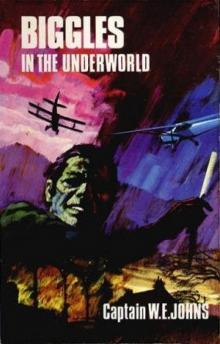 Biggles in the Underworld
Biggles in the Underworld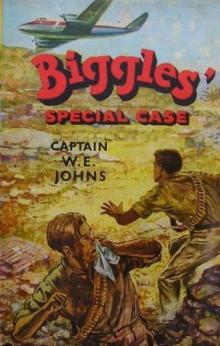 Biggles' Special Case
Biggles' Special Case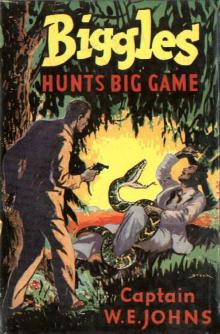 34 Biggles Hunts Big Game
34 Biggles Hunts Big Game 03 Now To The Stars
03 Now To The Stars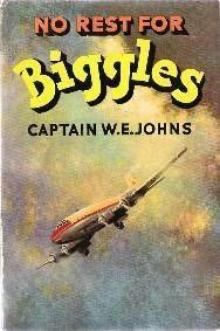 55 No Rest For Biggles
55 No Rest For Biggles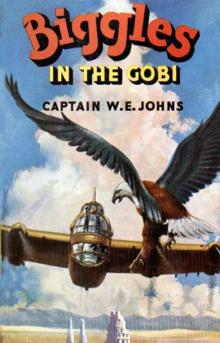 46 Biggles in the Gobi
46 Biggles in the Gobi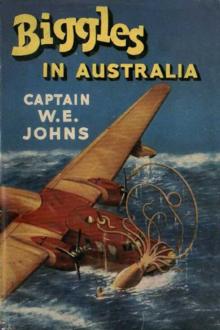 52 Biggles In Australia
52 Biggles In Australia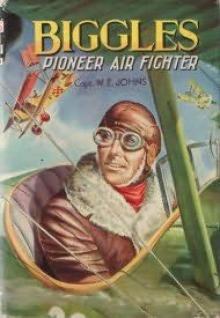 51 Biggles Pioneer Air Fighter
51 Biggles Pioneer Air Fighter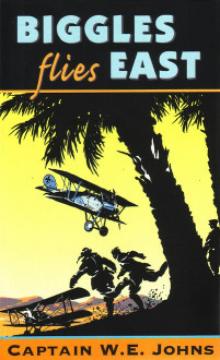 05 Biggles Flies East
05 Biggles Flies East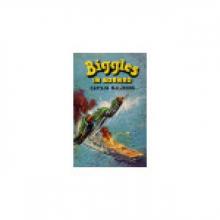 28 Biggles In Borneo
28 Biggles In Borneo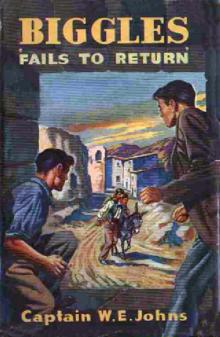 29 Biggles Fails to Return
29 Biggles Fails to Return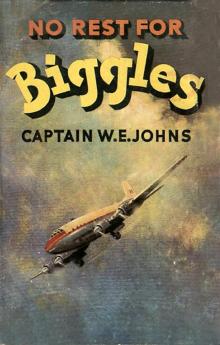 55 No Rest For Biggles (v2)
55 No Rest For Biggles (v2)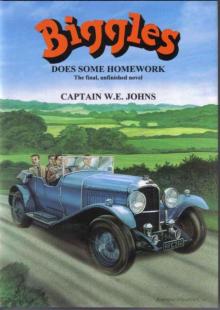 Biggles Does Some Homework
Biggles Does Some Homework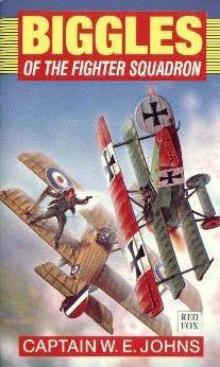 Biggles of the Camel Squadron
Biggles of the Camel Squadron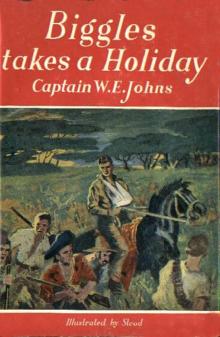 35 Biggles Takes A Holiday
35 Biggles Takes A Holiday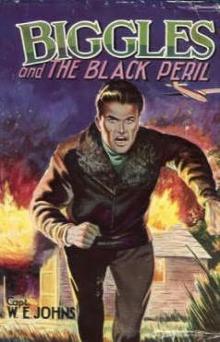 Biggles And The Black Peril (06)
Biggles And The Black Peril (06)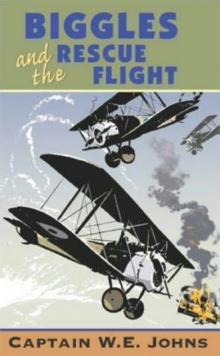 17 Biggles And The Rescue Flight
17 Biggles And The Rescue Flight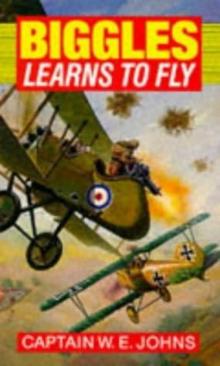 Biggles Learns To Fly
Biggles Learns To Fly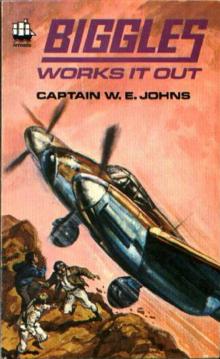 40 Biggles Works It Out
40 Biggles Works It Out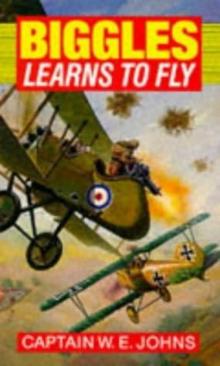 05 Biggles Learns To Fly
05 Biggles Learns To Fly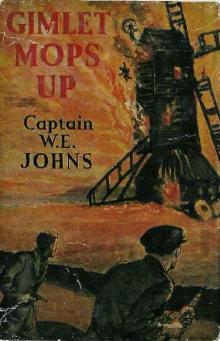 04 Gimlet Mops Up
04 Gimlet Mops Up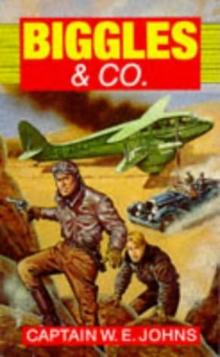 10 Biggles and Co
10 Biggles and Co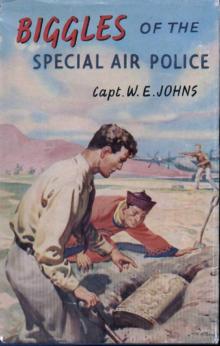 47 Biggles Of The Special Air Police
47 Biggles Of The Special Air Police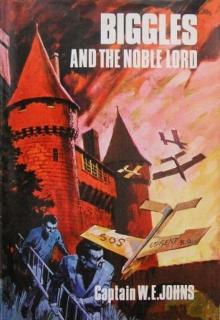 Biggles and the Noble Lord
Biggles and the Noble Lord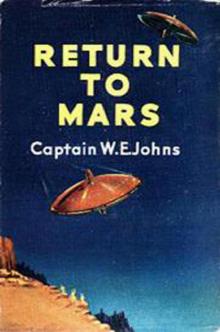 T2 Return To Mars
T2 Return To Mars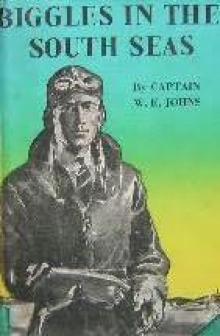 21 Biggles In the South Seas
21 Biggles In the South Seas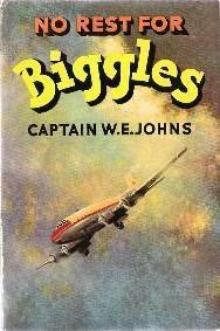 No Rest For Biggles
No Rest For Biggles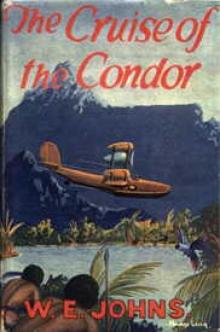 Biggles In The Cruise Of The Condor (02)
Biggles In The Cruise Of The Condor (02)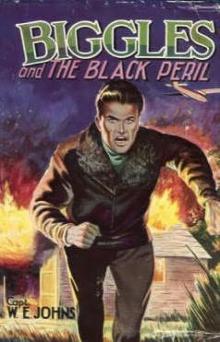 06 Biggles And The Black Peril
06 Biggles And The Black Peril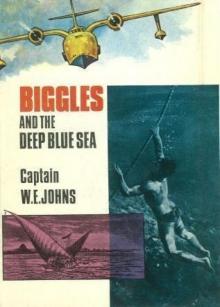 Biggles and the Deep Blue Sea
Biggles and the Deep Blue Sea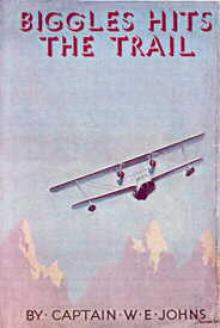 06 Biggles Hits The Trail
06 Biggles Hits The Trail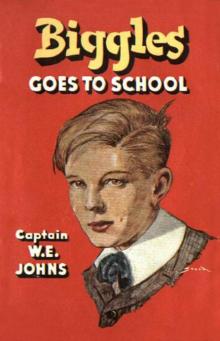 39 Biggles Goes To School
39 Biggles Goes To School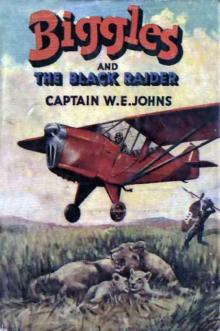 44 Biggles and the Black Raider
44 Biggles and the Black Raider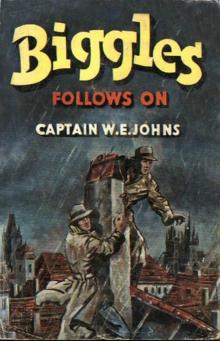 42 Biggles Follows On
42 Biggles Follows On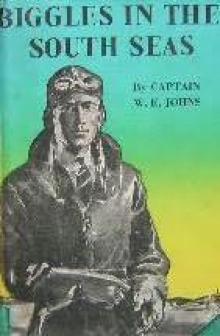 Biggles In the South Seas
Biggles In the South Seas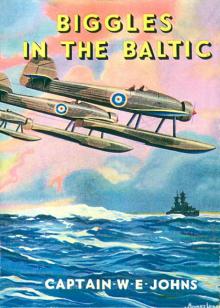 21 Biggles In The Baltic v3
21 Biggles In The Baltic v3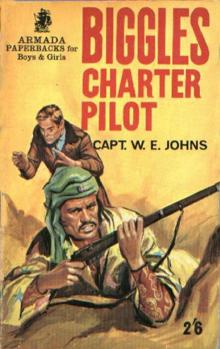 27 Biggles - Charter Pilot
27 Biggles - Charter Pilot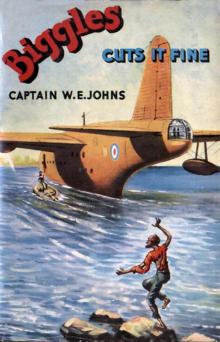 49 Biggles Cuts It Fine
49 Biggles Cuts It Fine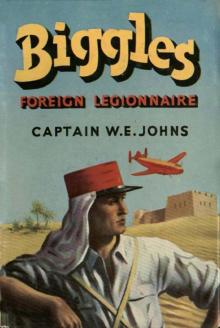 51 Biggles Foreign Legionaire
51 Biggles Foreign Legionaire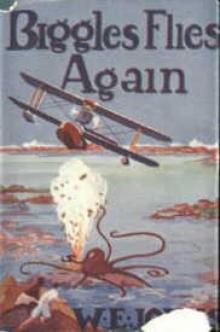 04 Biggles Flies Again
04 Biggles Flies Again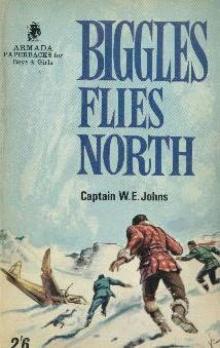 16 Biggles Flies North
16 Biggles Flies North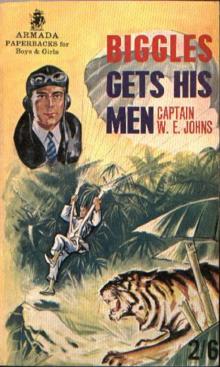 37 Biggles Gets His Men
37 Biggles Gets His Men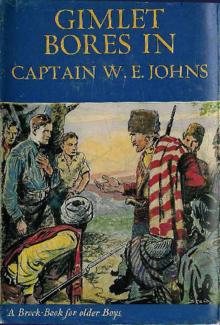 07 Gimlet Bores In
07 Gimlet Bores In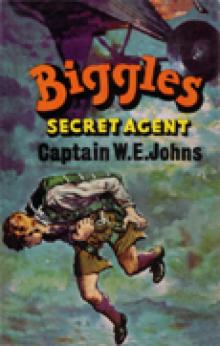 19 Biggles Secret Agent
19 Biggles Secret Agent 32 Biggles In The Orient
32 Biggles In The Orient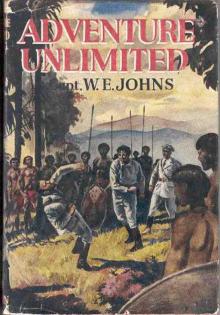 Adventure Unlimited
Adventure Unlimited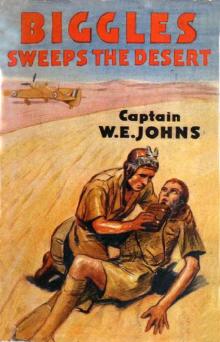 26 Biggles Sweeps The Desert
26 Biggles Sweeps The Desert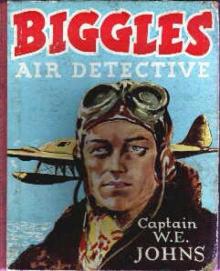 Biggles Air Detective (43)
Biggles Air Detective (43) 36 Biggles Breaks The Silence
36 Biggles Breaks The Silence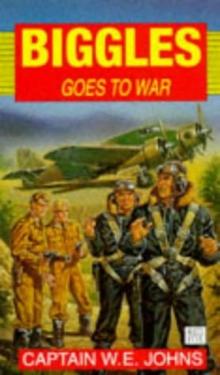 14 Biggles Goes To War
14 Biggles Goes To War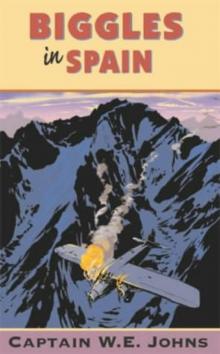 18 Biggles In Spain
18 Biggles In Spain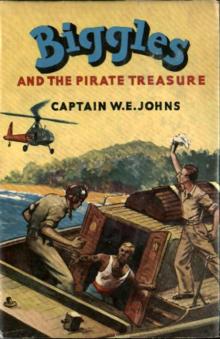 50 Biggles and the Pirate Treasure
50 Biggles and the Pirate Treasure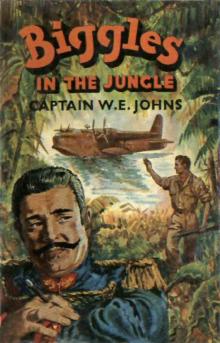 25 Biggles In The Jungle
25 Biggles In The Jungle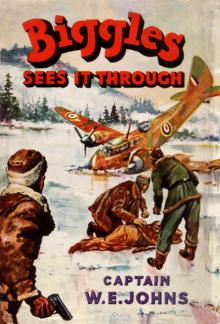 23 Biggles Sees It Through
23 Biggles Sees It Through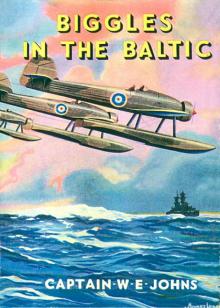 21 Biggles In The Baltic
21 Biggles In The Baltic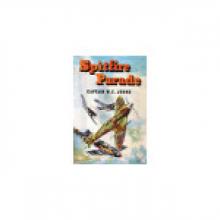 24 Spitfire Parade
24 Spitfire Parade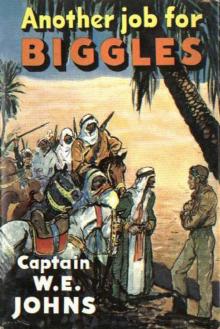 38 Another Job For Biggles
38 Another Job For Biggles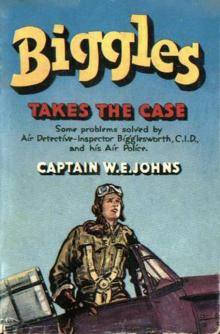 41 Biggles Takes The Case
41 Biggles Takes The Case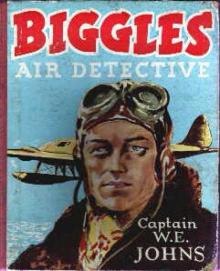 43 Biggles Air Detective
43 Biggles Air Detective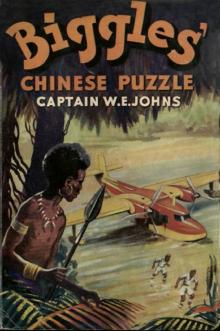 53 Biggles Chinese Puzzle
53 Biggles Chinese Puzzle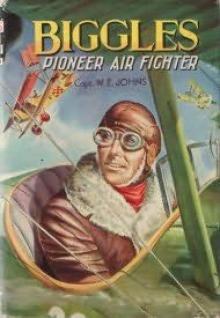 Biggles Pioneer Air Fighter (51)
Biggles Pioneer Air Fighter (51)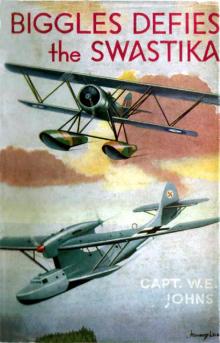 22 Biggles Defies The Swastika
22 Biggles Defies The Swastika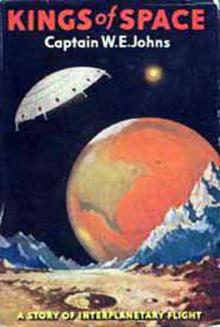 01 Kings Of Space
01 Kings Of Space